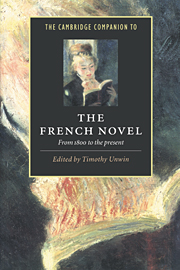Book contents
- Frontmatter
- 1 On the novel and the writing of literary history
- 2 Novels of testimony and the 'invention' of the modern French novel
- 3 Reality and its representation in the nineteenth-century novel
- 4 Women and fiction in the nineteenth century
- 5 Popular fiction in the nineteenth century
- 6 Decadence and the fin-de-siècle novel
- 7 The Proustian revolution
- 8 Formal experiment and innovation
- 9 Existentialism, engagement, ideology
- 10 War and the Holocaust
- 11 From serious to popular fiction
- 12 The colonial and postcolonial Francophone novel
- 13 The French-Canadian novel
- 14 Gender and sexual identity in the modern French novel
- 15 Postmodern Frenchfiction
- General bibliography
- Index
2 - Novels of testimony and the 'invention' of the modern French novel
Published online by Cambridge University Press: 28 May 2006
- Frontmatter
- 1 On the novel and the writing of literary history
- 2 Novels of testimony and the 'invention' of the modern French novel
- 3 Reality and its representation in the nineteenth-century novel
- 4 Women and fiction in the nineteenth century
- 5 Popular fiction in the nineteenth century
- 6 Decadence and the fin-de-siècle novel
- 7 The Proustian revolution
- 8 Formal experiment and innovation
- 9 Existentialism, engagement, ideology
- 10 War and the Holocaust
- 11 From serious to popular fiction
- 12 The colonial and postcolonial Francophone novel
- 13 The French-Canadian novel
- 14 Gender and sexual identity in the modern French novel
- 15 Postmodern Frenchfiction
- General bibliography
- Index
Summary
In 1801, in the preface to Atala, the first runaway bestseller of the new century, Francois-Rene de Chateaubriand offered an account of his text's evolution in the traumatic decade of the French Revolution. Atala was not a novel at all, he claimed, but a segment of an epic on Native Americans planned before the Revolution. He called this fragment of his writings from a trip to the United States in 1791 a 'sort of poem' (Œuvres romanesques et voyages, ed. Maurice Regard (Paris: Gallimard, 1969), vol. 1, p. 17) modelled on works of classical antiquity. Transformed in form and purpose by the events of the Revolution and Terror, this little book no longer figured as part of an epic, but was now offered up as a pre-publication teaser for its author's monumental historical and philosophical treatise, Le Génie du christianisme (1802) to which he claimed it now belonged.
For more than a century, Atala and its pair, René (1802), have served as the inaugural texts in a critical history of the modern French novel. By means of these fictions, and especially of Rene, Chateaubriand has been credited with inventing the 'Romantic novel', the 'autobiographical novel', even Romanticism itself. Immensely popular and critically appreciated for decades, these two works did indeed sound a clarion call at the dawn of the new century. They were marked by an indelible sense that the overturned 'natural order' could not be reinstated (see Œuvres romanesques, vol. 1, p. 17). For a young aristocrat like Chateaubriand, aged 31 in 1789, the Revolution had changed not just his financial or social expectations, but the entire vista of the future.
- Type
- Chapter
- Information
- The Cambridge Companion to the French NovelFrom 1800 to the Present, pp. 16 - 35Publisher: Cambridge University PressPrint publication year: 1997
- 82
- Cited by



